Top Iranian Commander Says Al-Aqsa Mosque To Be Liberated Soon
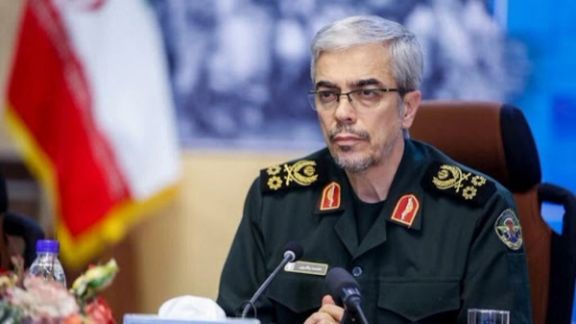
As the international community continues to denounce the recent Hamas invasion of Israel, Iranian officials are openly encouraging Palestinians to escalate their efforts.

As the international community continues to denounce the recent Hamas invasion of Israel, Iranian officials are openly encouraging Palestinians to escalate their efforts.
Mohammad Baqeri, the chairman of the chiefs of staff of the Iranian armed forces claimed it would not be long before Palestinian youth succeeded in liberating the Al-Aqsa Mosque from what he referred to as "the Zionist enemy."
He slammed the ongoing normalization attempts between Israel and Arab nations as a "plot" to prevent the collapse of the Jewish state, saying it “could neither halt nor delay the inevitable decline of Israel".
Iranian authorities have consistently criticized Saudi Arabia's efforts to establish relations with Israel, viewing such initiatives as detrimental to Palestinians.
Baqeri, in his message, also praised the efforts of Palestinian groups in their operations against “the Zionist armed forces in the occupied territories.”
Tehran has long provided support to militant Palestinian groups, including Hamas and the Islamic Jihad, both of which carried out the recent attacks against Israel and its civilians, resulting in the deaths and injuries of hundreds. The groups are part of Iran's extensive network of proxy forces that span the region from Iraq to Lebanon and Yemen. Tehran openly acknowledges providing financial and military assistance to the proxies.
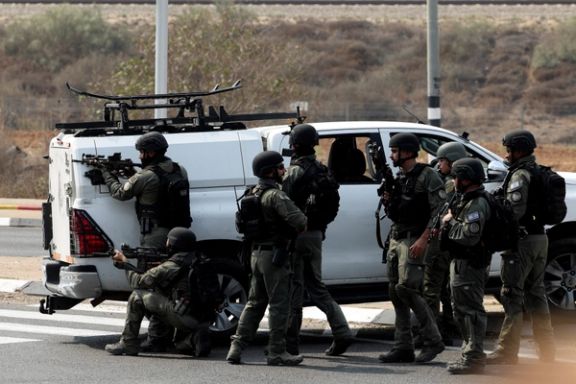
US President Joe Biden has sent a clear message to Tehran to back down as its Palestinian proxy, Hamas, rains down terror on Israel.
In a rare statement supporting the retaliatory action, Biden said Israel had the US’s unequivocal support. He said: “Let me say this as clearly as I can: This is not a moment for any party hostile to Israel to exploit these attacks to seek advantage,” in a veiled message to the regime.
Meanwhile talks are underway for the US to provide military support. Biden’s statements come as Tehran has been emboldened by a hostage deal which saw five US-Iranian citizens freed in exchange for the release of $6bn of frozen Iranian funds from South Korea. In addition, the US Biden administration agreed in June to release another $2.7 blocked in Iran.
Since Saturday morning, Hamas has sent thousands of rockets across the border into Israel with hundreds dead, hundreds more wounded and dozens of Israeli civilians and soldiers taken hostage, dead and alive into Gaza, including women, elderly and children.
The US made clear its support for Israel with US Defense Secretary Lloyd Austin making a public statement seen as a warning to the regime that the US will not stand by as Iran continues to arm its proxies.
“Over the coming days the Department of Defense will work to ensure that Israel has what it needs to defend itself and protect civilians from indiscriminate violence and terrorism,” he said.
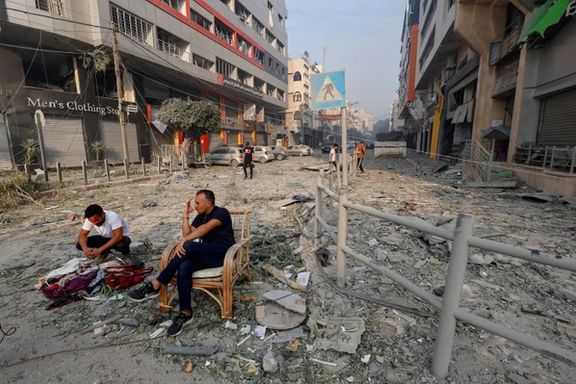
One of the Hamas spokespeople, Ghazi Hamad, told the BBC that the group had direct backing for the attack from Iran. Attacks were also seen across Israel’s northern border from Iran’s Lebanese proxy, Hezbollah.
Tehran has been bolstering unity between its proxies on Israel’s borders, in recent months. Just last week, another Hamas commander, Osama Hamdan, had been in Tehran while the leaders of Hamas, Palestinian Islamic Jihad (PIJ) and Popular Front for the Liberation of Palestine met with foreign minister Hossein Amir-Abdollahian in what was said to be a meeting to consolidate the various factions.
At last week’s International Conference Of Islamic Unity held in Iran, several of its proxies used the arena as a stage to call on unity against the region’s growing warm ties with Israel.
In 2020, the US-brokered Abraham Accords saw countries including Bahrain and the United Arab Emirates form official diplomatic ties and in recent weeks, relations with Saudi Arabia and Israel are growing ever closer, according the the Saudi Crown Prince, Mohammed bin Salman.
Hamdan went as far as to say that normalization is the biggest threat to the Palestinian people, calling for all to “stand and resist”, reiterating the group’s “condemnation” of nations normalizing ties with the Jewish state.
Meetings involving the Palestinian factions and the factions of Israel’s neighbors also took place last week, in Damascus and Beirut, alongside Hamas and the PIJ, mediated by the foreign minister on a regional tour believed to be cementing Iran’s policy across its proxies across Israel’s borders.
Former Iran envoy, Gabriel Noronha, called out a US official who claimed it was “too early” to say if Iran was behind the attacks on Israel, in spite of Hamas admissions that it was regime-backed.
Noronha wrote on X: “This not only contradicts Hamas' spokesperson's on-record confirmation, it ignores three decades of evidence,” including Yasser Arafat claiming in 1992 that Iran had provided $30 million to Hamas and in 1995, Clinton's CIA Director James Woolsey told Congress Iran had provided Hamas with $100 million.
Other criticism has been raining on the Biden administration. “None of what is happening in the Middle East today had to happen. The US since 2021 has allowed the Iranian regime to run riot and the Iranians have deliberately set the region on fire,” said Joel Rayburn, founder and director of the American Center for Levant Studies.
“This is the absolutely predictable consequence of wilful American negligence and weakness,” he said on X.
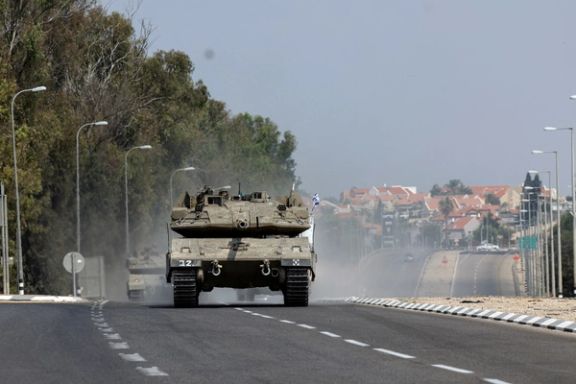
Overnight, Israel began its retaliatory attacks on targets in Gaza including infrastructure, tunnels and buildings belonging to Hamas. Hundreds of deaths were mounting on both sides.
According to Israeli media, more than 350 Israelis are feared dead, 1864 wounded and dozens more hostage in Gaza. So far the IDF has named 26 soldiers killed with the list being updated all day as families are informed.
According to the Palestine Ministry of Health, 313 have been killed following Israeli airstrikes and 2,000 wounded in Gaza.

Iran-backed armed group Hezbollah launched guided rockets and artillery onto three Israeli posts in the Shebaa Farms "in solidarity" with the Palestinian people.
Israel and Lebanon's armed group Hezbollah exchanged artillery and rocket fire on Sunday following the deadliest attack in years by Palestinian gunmen on Israel. There were no immediate reports of casualties in either Lebanon or Israel from Sunday's exchanges of fire.
On Saturday, a multi-pronged attack by Palestinian gunmen on Israeli towns left at least 250 Israelis dead, with more than 300 Palestinians killed in Israel's retaliatory bombardment.
The Israeli military said on Sunday it fired artillery into an area of Lebanon where cross-border fire was launched. "IDF (Israel Defense Forces) artillery is currently striking the area in Lebanon from where a shooting was carried out," it said.
Israel's military said one its drones struck a Hezbollah post in the area of Har Dov, an area in Shebaa.
"At this point, there is no further threat in Har Dov or the northern arena," IDF spokesperson Daniel Hagari said in televised remarks, adding that the military remained on high alert.
The IDF later said that it fired a warning shot toward a number of "suspects" in the same area in Har Dov.
A Lebanese security source told Reuters that a tent set up by Hezbollah in the Shebaa Farms had been hit and that Hezbollah fighters had erected a new one.
(Report by Reuters)
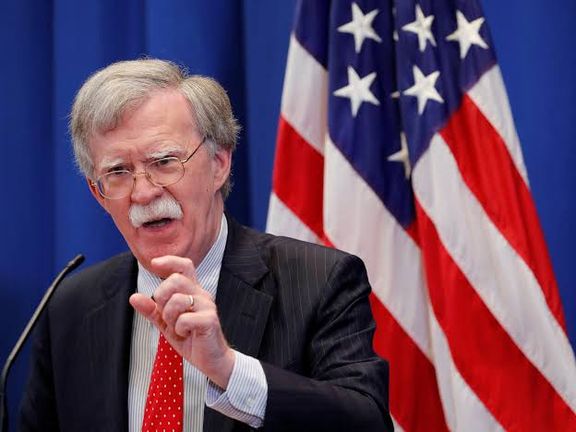
The recent Hamas terror attack on Israel has ignited a wave of criticism directed at the Biden Administration.
Some prominent US political figures expressed concerns over the administration's Iran deal and the release of funds that Iran is allegedly funneling to its proxies.
Former National Security Advisor of the United States, John Bolton, raised a pivotal question regarding the brutal Hamas attack on Israel asking whether Hamas acted independently or under orders from the Iranian government, which provides financial support, arms, and training to Hamas fighters. Bolton stated, "The evidence is becoming clearer hour by hour that the real aggressor here is Iran."
Morgan Ortagus, former Spokesperson for the United States Department of State, also condemned Iranian-backed terrorists for their reprehensible actions during the attack. She referred to disturbing videos circulating on social media that depicted Hamas militants brutally dragging the lifeless bodies of Israeli women through the streets after assaulting and killing them. Ortagus asserted, "Biden has got to stop sending billions of dollars to Iran. Just stop it."
Former CIA officer Norman Roule echoed similar sentiments, emphasizing the grave consequences of sanctions relief for Iran. He pointed out that while Iran has supported Hamas with hundreds of millions of dollars even under stringent sanctions, the recent relaxation of sanctions has significantly escalated Iran's support, resulting in deadly consequences for civilians.
Roule stated, "The next time someone argues that sanctions have no impact or presses for sanctions relief, remind them of this moment. Decisions have consequences."
The attack has resulted in a significant loss of life in Israel, with at least 250 people killed and 1,500 wounded, making it the deadliest assault on Israel in decades, people taken hostage in their homes, killed in the streets and in their cars, and whole villages under siege by Hamas militants who infiltrated by land, sea and air.
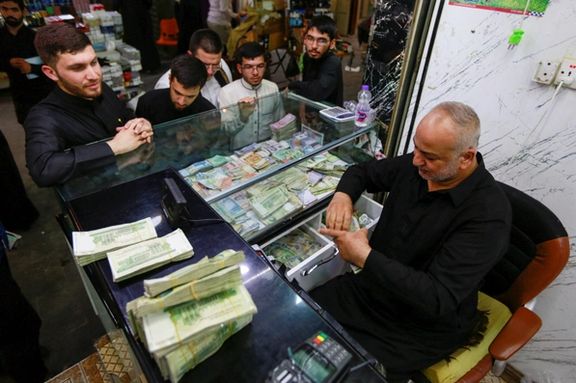
The Iranian currency has fallen noticeably in the past two days as the Palestinian Hamas unleashed a devastating attack on Israel early on Saturday.
The rial began to slightly fall late on Friday, before the attack, while the fall accelerated on Saturday. While for weeks the rial was hovering around 495,000 per US dollar, it broke through the 500,000 on Saturday and dropped to 515,000 on Sunday.
Iran is widely seen as supporting the militant Palestinian groups and specifically the attack launched on Saturday morning. Top Iranian officials and government media did not hide their glee at the initial success of the Hamas attack and expressed their outright support.
Israel has vowed punishing revenge against Hamas, but the prospect of escalation beyond the Palestinian territories, and possible military conflict with Iran is apparently increasing the demand for the US dollar and other major currencies in Tehran.
The rial has lost its value 12-fold since early 2018, when the United States withdrew from the JCPOA nuclear deal and imposed tough economic sanctions on Iran. This has made imports much more expensive and has led to very high inflation at around 50 percent for the past three years.
Some officials and media in Tehran have been warning that tens of millions of people have fallen into poverty because of persistent high inflation, and this in turn has seriously contributed to political instability. Widespread anti-regime protests in 2022 and 2023 are partly attributed to financial hardships ordinary citizens face.
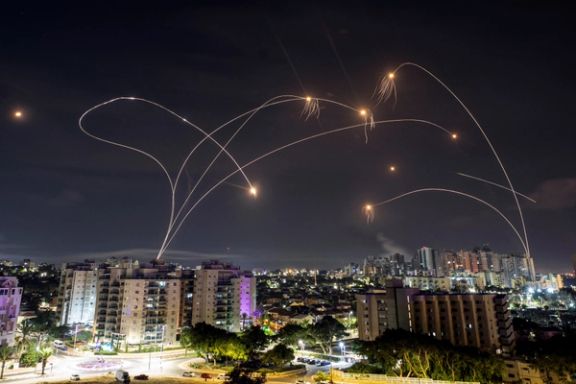
Hamas’ unprecedented and deadly attack on Israel has once more put the Iranian regime and the Biden administration's Iran policy at the center of attention.
“What's going with Israel right now…,” said former President Donald Trump “I wasn't shocked because two weeks ago we gave them 6 billion dollars.”
He was referring to the $6 billion in Iran’s frozen oil revenues that the Biden administration agreed to release from South Korea as part of a ‘prisoner swap’ deal with the Islamic Republic.
The same line has come from many in Washington who see Biden’s lenient approach to Iran as flawed and counterproductive.
“Since Biden took office Iran’s accessible foreign exchange reserves went from <$6B (same as Haiti!) to $70B,” posted David Greenaway, Director of Centre for National Defense, “anyone arguing this doesn’t support terrorism is either wholly ignorant, lying, or both.”
The Biden administration sensing that the criticism can badly hurt its image, responded immediately, arguing that the money made available to Iran in return for the release of five prisoners “has nothing to do with the horrific attack on Israel.”
“Not a penny has been spent, and when it is, it can only go for humanitarian needs like food and medicine,” said the State Department’s spokesperson, Matthew Miller. A senior Treasury official reiterated that the funds cannot be directed to Iran. “Any suggestion to the contrary is false and misleading,” Brian Nelson said.
However, critics responded that this argument is flawed because money is fungible. When Iran can buy essential food with the funds released, it would be able to use its own money for military and malign activities.
AFP news agency quoted a senior White House official as saying that it was “too early to say” whether Iran was “directly involved” in the large-scale terror attack. However, at the same time, Hamas Spokesman Ghazi Hamad confirmed in an interview with BBC what everybody sensed: that Hamas’ large-scale attack on Israel had the “support of the regime in Iran. “
Ali Khamenei for his part all but officially confirmed his regime’s involvement on X (formerly Twitter).
Reposting a viral clip of Israelis running away from Hamas forces, Khamenei wrote “God willing, the cancer of the usurper Zionist regime will be eradicated at the hands of the Palestinian people and the Resistance forces throughout the region.”
The post was tagged by X, pointing out that it had violated the X Rules, but X had determined that “it may be in the public’s interest for the post to remain accessible.”
At the same time, images emerged from Iran that showed ultra-hardline Basijis celebrating Hamas’ attack on Israel, calling it a ‘Palestinian Victory.’
A spokesperson for the Islamic Republic’s Foreign Ministry Spokesman called the attacks ‘‘a new chapter in the continuing resistance and armed operations” against Israel. The surprise attack showed that “the Palestinian resistance is confidently capable of conducting hybrid and multilateral operations against the occupiers,” Kanaani said.
The attacks took place on the 50th anniversary of the Yom Kippur war which began on October 6, 1973, when Egypt and Syria launched a surprise attack on Israel during the Jewish holy day of Yom Kippur. The war led to diplomatic efforts that eventually resulted in the Camp David Accords in 1978 and the Egypt-Israel Peace Treaty in 1979.
Israel had never suffered like this in an armed conflict since that War.
Reports suggest that more than 200 Israelis have been killed in the attack and dozens might have been taken hostage.
The attack –and the Israeli retaliation, which may involve large-scale ground assault– would likely affect the negotiations between Israel and Saudi Arabia and the chances of a deal to normalize Israel-Saudi ties.
There were reports that Saudi Arabia had asked for a ‘gesture’ towards the Palestinians as a condition of the deal. Any such concession for the Netanyahu administration, if it were ever considered, is almost impossible now. The deal that many in Washington believed was ‘only a matter of time’ seems quite far away now.
It remains to be seen how this episode would impact the newly-normalized relationship between Iran and Saudi Arabia –and even the 2024 elections in the US, as criticism of the Biden administration for its Iran policy grows.